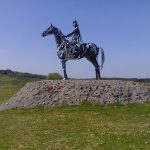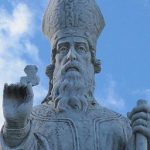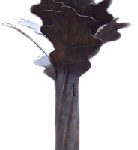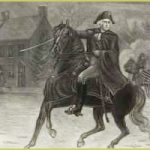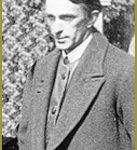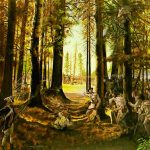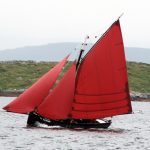The year was 1587, and the English inside the Pale - a fortified district around Dublin - were concerned about the Irish Chieftains whom they had not yet brought under their control - especially in Ulster. The Ulster clans were an independent lot, and something had to be done to insure their non-interference with Crown activities. One of the more powerful clans was the O'Donnell of Tyr Connail, the present day Donegal. One day, a trading ship sailed across Lough Swilly offering Spanish wines, and fine fabrics for the Donegal Chieftains and their ladies. Red Hugh O'Donnell, the 15-year old … [Read more...] about Red Hugh O’Donnell
Grosse Ile and the Irish
Before 1831, Canada-bound vessels carried immigrants directly to Quebec, where they were visited on board by a doctor to see if they were well. Inspection was cursory and healthy passengers were allowed to land while sick patients were taken to hospital. Before 1823, Catholic organizations cared for those arriving in distress, but in that year an increase in numbers necessitated government provision. In 1830 a hospital was opened at Point Levé across the St. Lawrence river from Quebec city. In 1831, an outbreak of cholera in Europe necessitated the opening of a quarantine hospital on … [Read more...] about Grosse Ile and the Irish
Independence Day, July 4th
Independence Day, July 4, is America's biggest holiday. Its her birthday; but it doesn't mark the day she won her independence, it marks the day when it was declared. And the Irish were there. We've often heard of the Irish in America's Patriot Army, but lets look at the non-military - those who were unable to suffer the hardship of a colonial soldier, but contributed in other ways. The military won the war, but who led the march toward the battlefield? It was the settlers, merchants, and community leaders who were the real shapers of our destiny, for they were the ones who dreamt the … [Read more...] about Independence Day, July 4th
Kelly, the Boy from Killane
Kelly is second only to Murphy as the most populous Irish name, and it is therefore logical to find it often in Ireland's songs. According to Father Woulfe's Irish Names and Surnames, Kelly derives from Ceallac meaning Warlike, and it seems that Kelly's have lived up to that meaning not only in Ireland, but wherever they went. In the wars of the United States, the name Kelly appears frequently among those decorated for bravery. The first American hero of WWI was Colin Kelly who received the Congressional Medal of Honor; and Joseph Clarke wrote a famous poem about a trio of Irish Heros in the … [Read more...] about Kelly, the Boy from Killane
William Percy French
It was on the first of May in 1854 that a boy was born at Cloonyquinn, Co Roscommon to Christopher French and his wife, the former Miss Percy. The second of two sons, he was named William Percy French and in his lifetime he became one of Ireland’s most beloved entertainers and gifted songwriters. His father, believing that Percy was mathematically inclined, sent him to Trinity College to study Civil engineering. Percy however, had different ideas. Instead of devoting himself to his studies, he spent most of his time developing his remarkable talent for song writing, dramatics, playing banjo … [Read more...] about William Percy French
Leperchaun – Legend or History
Every year around March 17 we get the question: are there really such things as Leprechauns and I thought I’d put the record straight. The truth lies in Ireland's ancient manuscripts describing her early settlers. The manuscripts contain so much detail that it is hard to believe they are historically accurate. However, since they are the basis of many traditions, they are worth studying. Further, many have been partially corroborated by archeological evidence, so shouldn’t we at least consider the possible accuracy of the others. Among the early settlers of Ireland, lines of succession … [Read more...] about Leperchaun – Legend or History
Who is St. Patrick?
Each year around March 17, the name of St. Patrick appears in every major publication in the civilized world - sometimes with honor and sometimes with scorn - often due to the conduct of those who celebrate his memory at affairs which bear his name. Of the many things written about this holy man, some are true, some misleading, and some false. St. Patrick was Italian; St. Patrick drove the snakes from Ireland; St. Patrick was the first to bring Christianity to Ireland - all of these statements are false! Let’s take them one at a time. Some claim St. Patrick to be Italian … [Read more...] about Who is St. Patrick?
Solas Bhride (Light of Brigid)
In pre-Christian times, a sacred fire burned in a shrine to the Celtic Goddess Brighid (Breeje), a trio of sisters, all named Brighid, who were treated as one person. She was the goddess of fertility, of metal smithing, and of all cultural learning. In her latter persona, she was the inspiration of poetry, song and history. The shrine was called Cil Dara (Church of the Oak) since oak was a sacred wood to the Druids, and priestesses maintained a ritual fire to her there for fire was the manifestation of knowledge. The area around Cil Dara became known as County Kildare. In the sixth … [Read more...] about Solas Bhride (Light of Brigid)
Paddy Colvin’s Unforgettable New Year
There were few Irishmen in Trenton, NJ prior to the Revolutionary War. Among them were Paddy Colvin and Sam McConkey, who ran two Delaware River ferries; Paddy Lamb, who resided near Quaker Bridge on Assunpink Creek; and Bernie Hanlon, a mill-owner who later became a deputy aldermen. They were all there during a very special Christmas adventure, but Paddy Colvin’s name had been forgotten for 100 years. In 1885, Rev A. Lambing, compiling a volume for Catholic Historical Research, found an interesting document. He wrote, Not long ago, when reading one of the Trenton papers, I saw the simple … [Read more...] about Paddy Colvin’s Unforgettable New Year
They Died in December
Rory O'Connor was born in Dublin in 1883. He was educated at St. Mary’s College, Clongowes Wood College, and University College, Dublin. With his College of Science diploma, he emigrated to Canada in 1911 to work as a railway engineer. He became active in the Fenian Brotherhood and returned to Ireland in 1915 in answer to an IRB call. He joined the Ancient Order of Hibernians, fought in the 1916 Easter Rising and was interned after the surrender. After internment, he quit the IRB on the grounds that a secret movement could not gain popular support and threw his support to Sinn Fein. … [Read more...] about They Died in December
An Echo from Irish History for November
History as written is not always accurate. Revised versions of past events have often been presented to support a specific agenda, quoting facts out of context, citing only those which support conclusions already reached, and exaggerating, minimizing or omitting those that don't. Some revise history to glorify or inspire support for a cause or cover up transgressions of their predecessors. In recent years a number of books have appeared that explode some of the myths of history, but sadly, many revisionist versions are still presented as fact in our school texts. One of the most revised … [Read more...] about An Echo from Irish History for November
The Seafaring Irish
Ireland has the largest percentage of coastline in Europe, in fact, there are few spots in Ireland more than 70 miles from water. That circumstance led many to ask why the victims of The Great Hunger didn’t simply go fishing? It has been suggested that if they had been a seafaring race, they would have avoided much of that tragedy. The fact is that the early Irish were a seafaring race, and the suggestion that they weren't only illustrates the misinformation surrounding the period known as The Great Hunger. That the early Irish were no strangers to the sea is revealed in her ancient … [Read more...] about The Seafaring Irish
It Happened in August
The Medal of Honor, sometimes referred to as the Congressional Medal of Honor since it is awarded by Congress, is the highest military decoration awarded by the United States. It signifies uncommon valor above and beyond the call of duty in defense of our nation - often at the risk of life and limb. Since March, 1863, when the first Medal of Honor was presented, 254 have been received by native-born Irishmen - more than twice the number given to any other foreign-born nationality. When America decided to establish a memorial to those whose extraordinary valor defended her in times of need, a … [Read more...] about It Happened in August
It Happened in July
Many things happened in the month of July which have a significant meaning to those of Irish descent. Among the many are the Irish and Irish Americans who contributed to the American Revolution that created this great nation and those who subsequently defended it. Among the latter are many familiar names, but there are also some who are not that familiar, but should be. One example of the latter is Patrick Henry O’Rorke. Who? Exactly! Patrick Henry O’Rorke was born in County Cavan on March 28, 1836. His parents brought him to America as a child and settled in the section of Rochester, NY … [Read more...] about It Happened in July
It Happened in June
In the early 1700s, Maurice O’Brien, a native of Co. Cork, emigrated to America and settled in Kittery (near Portsmouth), then moved to Scarborough (near Portland), Maine. He was a volunteer in the expedition against Louisburg in 1745 which was one of the most extraordinary military achievements of the New England Colonies. Louisburg, on the Island of Cape Breton, belonged to the French who threatened the New England lumber industry and spent millions erecting fortifications. The New Englanders attacked and won the fort. In 1765, O’Brien moved to Machias, about 50 miles up the Maine coast … [Read more...] about It Happened in June
West Virginia Petroglyph
On June 24th 1976 a strange craft, made of ox hides stretched over a wooden frame, was sighted off the coast of the Faroe Islands. Two square sails, painted with Celtic crosses, billowed above The Brendan, a replica of the craft in which Irish monks had first sailed this way. Historian and Explorer, Tim Severin, built her from the description of his craft in the writings of St. Brendan the Navigator, regarding his sixth century journey to America. From the Faroes, Severin set out for Reykjavík, Iceland and ultimately Newfoundland following the route of St. Brendan in an effort to prove that … [Read more...] about West Virginia Petroglyph
An Irish Tale for April
Once upon a time there was a beautiful mansion of 32 rooms, divided into four wings. The family that owned the mansion allowed its use as a monastery – a center for scholarship. Great artistic treasures were made there and all its neighbors benefitted, for the family willingly shared its learning. One day, a neighboring tribe raided the mansion and took possession of all its property. They halted the learning and stole all the treasures. The family that had been the former owners were enslaved as servants to the invaders. Servitude became a way of life for the former owners, they were … [Read more...] about An Irish Tale for April
A Great Day for the Irish
Welcome to the month of Saint Patrick, a time of joyous celebration among the Irish around the world. And why do we celebrate? Because we’re Irish. It’s been said that the Irish passion for their heritage gets stronger, the further they are from the Emerald Isle, and that may partially explain the popularity of this day, for whether or not they were poor in material possessions, the Irish always managed to carry with them, their unique culture, traditions, and religion. And Saint Patrick is part of all three. As a result of the Diaspora of the Irish throughout the world, no one in the entire … [Read more...] about A Great Day for the Irish
A Promise Fulfilled
Frank Stagg, of Hollymount, County Mayo, came from a long line of Irish republicans. His father had fought in both the War of Independence and the Civil War. In the 1970s, Frank emigrated to England, where he worked as a bus conductor in North London. He joined Sinn Féin in 1972 and shortly thereafter joined the IRA. In April 1973, he was arrested in Coventry and charged under ancient Conspiracy Laws, which were often used to convict IRA members when there was not enough concrete evidence. Frank Stagg, Father Patrick Fell, and five others were convicted of conspiracy to commit arson and given … [Read more...] about A Promise Fulfilled
Spirit of the Occasion
In 1798, the United Irishmen attempted to free their native land. Upon the stage of that rebellion, several characters played out their parts little knowing that they would meet again, with different results. The successful start to the rebellion took place in Wexford, but was brutally crushed by British forces. Theobold Wolfe Tone, one of the primary leaders of the United Irishmen, had secured the promise of French aid, but the French forces, under General Humbert, arrived too late, and too far north to help poor Wexford. Their landing in Mayo however, rekindled the fire of rebellion, and … [Read more...] about Spirit of the Occasion
